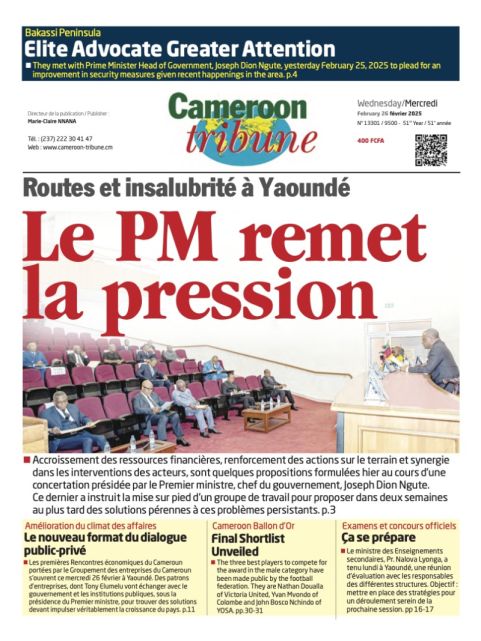Fanning the Flame of Emergence
- Par LUKONG Pius NYUYLIME
- 03 janv. 2020 11:14
- 0 Likes
The signposts of achieving economic growth and attaining emergence in 2035 seem to be clear in the eyes of the Head of State. These wordings pronounced in his message to the nation last December 31, aptly tell his vision of the country's economic performance. " Our growth has picked up again, inflation is under control, budget and external deficits are contained and our public debt remains sustainable." Even though President Biya singles out this as some of the fruits obtained thanks to the Economic and Financial Programme concluded with the IMF, a medley of elements militate in favour of the facts and figures that tell of the collective effort piloted by government to keep the flame of economic growth burning. As indicated in last Tuesday's address, government’s 2020 Economic, Financial, Social and Cultural Programme, presented recently before the National Assembly, is consistent with this trend. It is based on a 4 per cent growth assumption, which is expected to keep us on the path to emergence by 2035.
The drive towards achieving emergence from every indication is taking into consideration the tenets of economic growth that incidentally form the foundation of such a goal. In effect, achieving economic growth entails an increase in the capacity of an economy to produce goods and services, compared from one period of time to another. We are talking about increasing quality and quantity of the factors of production, which consist of four broad types: land, labour, capital, and entrepreneurship. As stated by President Biya, "the draft National Development Strategy for the 2020-2030 period seeks to achieve the same objectives." The strategy in its real component sets out to structurally transform the country's economy from a primary-driven sector stage to an industrial economy. This will be done by bringing in new investments, generating new activities, adding value to local products by transforming raw material, retaining jobs and making sure that the wealth generated through strong inclusive growth is rationally shared among the population.
In spite of the support from the IMF, the World Bank, the African Development Bank and the French Development Agency in connection with the country's budgetary and structural reforms, the Head of State warns that Camer...
Cet article complet est réservé aux abonnés
Déjà abonné ? Identifiez-vous >
Accédez en illimité à Cameroon Tribune Digital à partir de 26250 FCFA
Je M'abonne1 minute suffit pour vous abonner à Cameroon Tribune Digital !
- Votre numéro spécial cameroon-tribune en version numérique
- Des encarts
- Des appels d'offres exclusives
- D'avant-première (accès 24h avant la publication)
- Des éditions consultables sur tous supports (smartphone, tablettes, PC)











Commentaires